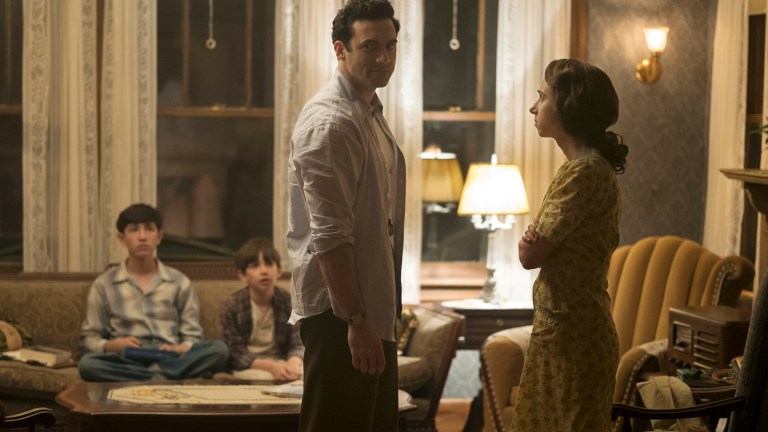The Plot Against America Review (Spoiler-Free)

This The Plot Against America review contains no spoilers.
It’s an old adage that most science fiction is written looking toward the future through the lens of the present. However, as recent period piece television series are proving, that trend seems to be turning backwards as well. Both ongoing and limited series like Chernobyl and The Americans are excavating specific points in our past for the sake of contemporary society.
While Philip Roth published his alternate-history novel The Plot Against America in 2004, the 2020 HBO adaptation helmed by The Wire co-creators David Simon and Ed Burns could not have been written for any time but the present. Told over only six hour-long episodes that span a little over two years (1940-1942), Plot tracks an alternate history in which aviator and national hero Charles Lindbergh (Ben Cole) beats Franklin Delano Roosevelt to become president of the United States. Manipulating the country’s nervousness about entering World War II as motivation, and scapegoating the American Jewish population, Lindbergh draws xenophobic, fascist lines between peace and war, and supposed “true” American citizens versus Jews.
All this is viewed through the life of a working-class Jewish family living in Newark, New Jersey: the Levins (the Roths in the novel), with young Philip the most susceptible to the growing violence and anti-semitism that colors his adolescence. Masterfully shot and sensitively rendered, the limited series hits home because of the family at its core, who by the end of the half-dozen episodes you will feel as emotionally invested in as if you were one of their close-knit neighbors.
Most striking is how subtly The Plot Against America unspools its alternate history. This is not Amazon Studios’ The Man in the High Castle, with provocative shots of the Statue of Liberty giving the Nazi salute, or fast-paced multi-layered thriller plots. Each episode jumps three to six months ahead, so that it’s more of a snapshot than anything else—capturing a moment in time like older brother and Lindbergh fanboy Sandy’s (Caleb Malis) sketches, or Philip’s stamp collection.
As these boys witness, all it takes to “other” their community are specific, well-timed statements from people in power: conflations of American Jews with their European counterparts who are beginning to be rounded up in concentration camps; accusations that the Levins, who begin to rightly fear for their safety, are somehow the narrow-minded ones. Throughout all this, Philip and Sandy’s parents Herman (Morgan Spector) and Bess (Zoe Kazan) struggle with how much to expose their children to the societal shift toward hate—but that’s the problem, at some point the anti-semitism becomes too obvious to hide from them.
Simon and Burns smartly balance the technological constraints of the time with the need to mirror our current society, especially where it comes to how Americans get their news. Obviously Twitter was inconceivable in the 1940s, and television was decades away from having an impact on presidential campaigns. Instead, it’s the radio that the Levins cluster around for updates on the Lindbergh/Roosevelt election results, then for Bengelsdorf’s incendiary speeches, and later for the latest news on the growing anti-Semitic riots and attacks. The radio carries Lindbergh’s charismatic speeches across the airwaves to his growing base of America First supporters, but it also amplifies dissenters like the real-life radio personality Walter Winchell, whose alt-universe self goes from yammering about gossip to publicly calling out the sitting president.
Both Bess and Herman have ne’er-do-well relations who get up to all manner of trouble in between Shabbos dinners: her older, unmarried sister Evelyn (Winona Ryder), who keeps getting involved with bad men; and his nephew Alvin (Anthony Boyle), who won’t be content until Nazis are getting punched, and wants to be the one to do it.
Alvin gets his chance upon enlisting with Canada’s army in the war, the U.S. having signed a neutrality agreement under Lindbergh, though that noble idealism quickly turns brittle and cynical. Meanwhile, Evelyn attaches herself to the seemingly respectable Rabbi Lionel Bengelsdorf (John Turturro, giving Knives Out’s Daniel Craig a run for his money with his Southern elocution). But as he hitches his wagon to Lindbergh’s star, Evelyn soon finds herself unwittingly helping to enact policies, through the chilling Office of American Absorption, that endanger their people and especially her family.
Ryder plays Evelyn with the same wide-eyed panic that gave her a career resurgence as Stranger Things’ Joyce Byers (and made her a relatably confused meme at the 2017 SAG Awards). As much as you will detest her stubborn push forward with the OAA and especially her willingness to manipulate Sandy’s yearning to experience the rest of America beyond Newark, her story of getting mixed up with the wrong cause is not an unfamiliar one.
Similarly, Boyle plays Alvin as an orphan running through a half-dozen different lifetimes in just two years, careering between depressed self-loathing and self-made man. The “hey, I’m from New Jersey” bravado can grate at times, yet it belies Alvin’s true terror at becoming embedded in history. It also pits him solidly against Herman in the ideological divide of whether it’s better to speak out against bigotry or put your money where your mouth is.
By contrast to these black sheep, the Levins as nuclear family would seem as stable as any nostalgic memory of one’s childhood home. But in actuality, that same two years sees incredible tensions simmer between Bess and Herman: stay in America or flee for the border; fight and protest or stay at home to protect their children? Spector’s performance as Herman, with his helpless anger, is commendable and pushes much of the Levins’ plot forward. But Kazan is the standout performance in this series: from relatively meek, agreeable housewife who shoulders her era-appropriate load of emotional labor to revealing the steel she always hid beneath her maternal smiles. Despite the fact that it’s her husband who keeps vigil beside the radio, Bess is the smartest person in the room—and part of the tragedy is that no one listens to her until it’s too late.
Without giving too much away, The Plot Against America ends on a note of hope that is as small as the inciting incident that first got Lindbergh elected. The ambiguity may be more frustrating and unfulfilling than The Man in the High Castle’s handy portals to a parallel universe where things went right, but it’s also more compelling: These characters in this world made particular choices, and they must live with the consequences. As history continues to repeat itself, perhaps today’s audiences will actually take that hindsight to heart.
